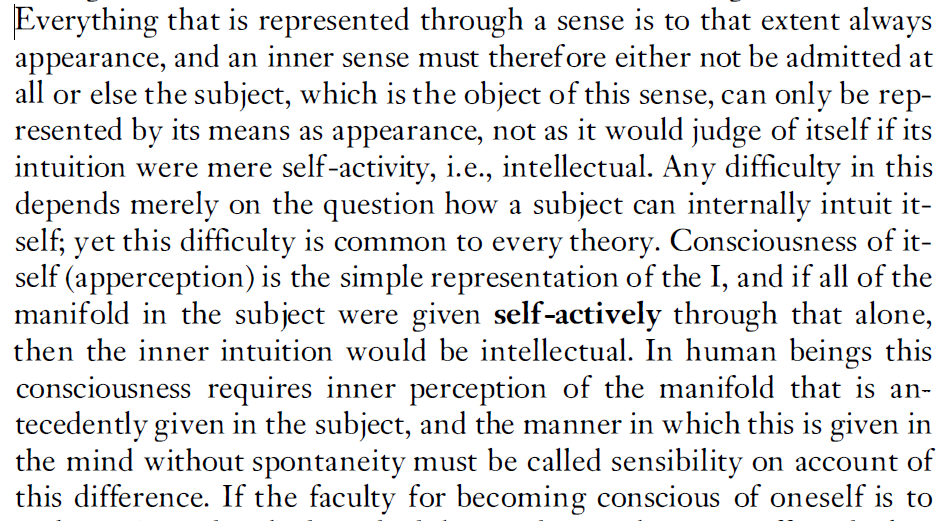The "objects" of the inner sense include things like feelings, emotions, and desires (when desire is not always something felt). We are conscious of their manifold in time (we are sad at one time and happy at another, for example), though not as extended throughout space (I think this might be a somewhat parochial claim of Kant's, as some people, including myself, seem to spatially localize many/most/all of our feelings/desires).
Generally, he says at one point, "A perception which relates solely to the subject as a modification of its state, is a sensation (sensatio)," and this pertains to the anticipations of perception:
Apprehension, by means of sensation alone, fills only one moment, that is, if I do not take into consideration a succession of many sensations. As that in the phenomenon, the apprehension of which is not a successive synthesis advancing from parts to an entire representation, sensation has therefore no extensive quantity; the want of sensation in a moment of time would represent it as empty, consequently = 0. That which in the empirical intuition corresponds to sensation is reality (realitas phaenomenon); that which corresponds to the absence of it, negation = 0. Now every sensation is capable of a diminution, so that it can decrease, and thus gradually disappear. Therefore, between reality in a phenomenon and negation, there exists a continuous concatenation of many possible intermediate sensations, the difference of which from each other is always smaller than that between the given sensation and zero, or complete negation. That is to say, the real in a phenomenon has always a quantity, which however is not discoverable in apprehension, inasmuch as apprehension take place by means of mere sensation in one instant, and not by the successive synthesis of many sensations, and therefore does not progress from parts to the whole. Consequently, it has a quantity, but not an extensive quantity.
So later (in the Transcendental Dialectic), Kant will controvert Moses Mendelssohn by saying that:
But this philosopher did not consider that, granting the soul to possess this simple nature, which contains no parts external to each other and consequently no extensive quantity, we cannot refuse to it any less than to any other being, intensive quantity, that is, a degree of reality in regard to all its faculties, nay, to all that constitutes its existence. But this degree of reality can become less and less through an infinite series of smaller degrees. It follows, therefore, that this supposed substance—this thing, the permanence of which is not assured in any other way, may, if not by decomposition, by gradual loss (remissio) of its powers (consequently by elanguescence, if I may employ this expression), be changed into nothing.
If apperception were intellectual, then, all of the above would have to be drastically reconsidered; but, assuming that there is an element of passivity or receptiveness in much of our apperception, including via the inner temporal sense (the sense of the inner identity of objects, including ourselves as objects, over time), allows us to conclude with Kant's so-called "refutation of idealism":
I am conscious of my own existence as determined in time. All determination in regard to time presupposes the existence of something permanent in perception. But this permanent something cannot be something in me, for the very reason that my existence in time is itself determined by this permanent something.
Again, consciousness in its intensive quantity is not permanent enough to do the job of refuting skepticism about the external world; so there is a permanent quantity that is not our mere consciousness, by which the proof is accomplished, and this on account, in part, of the passivity of our inner apprehension. By contrast, if all our representations, internal and external, were dependent on our spontaneous will, it would seem to follow that our inner sense would be replaced by a sense of our will; but Kant will starkly claim, again and again, that we do not have (much of) an intuition of our inner free will.

